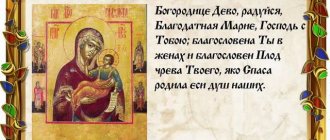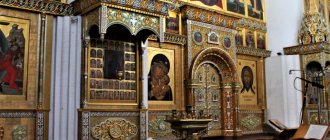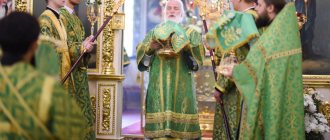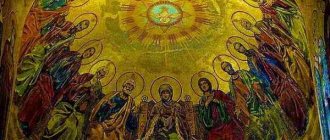The path to a new life is repentance
Although Ephraim the Syrian was born and raised by Christian parents, in his youth he was not distinguished by fear of God and humility. He himself admitted that he often committed unseemly acts, was distinguished by rudeness and irritability, often undeservedly offended people verbally and physically, and was also not without many vices.
It is difficult to say how his fate would have turned out if one day, having found himself in an emergency situation, in a dream he had not heard a voice that invited him to weigh and evaluate everything that he had done and the condition of the people whom he had offended.
The thoughts of Ephraim the Syrian led to deep repentance, after which he became a hermit and mourned his sins for the rest of his life, for which he received the name “teacher of contrition.”
For those who want to take the righteous path, repenting of their sins, the prayer of St. Ephraim the Syrian will help, which is read during Great Lent (reading begins a week before the start of fasting - on Tuesday of Cheese Week) until Great Wednesday of Holy Week, except Saturday and Sunday, which is why it is often called Lenten.
Commentary on the book of Genesis
The Monk Ephraim the Syrian, teacher of repentance, was born at the beginning of the 4th century (the year of his birth is precisely unknown) in the city of Nisibia (Mesopotamia) into a Christian family of poor farmers.
The parents raised their son in piety. But, distinguished from childhood by a hot-tempered, irritable character, in his youth he often quarreled, committed rash acts, even doubted the Providence of God, until he received admonition from the Lord, which directed him to the path of repentance and salvation.
One day he was unjustly accused of stealing sheep and put in prison. In it, he heard a voice in a dream calling him to repentance and correct his life. He was acquitted and released.
Deep repentance awakened in Ephraim. The young man retired to the surrounding mountains and became a hermit. This kind of Christian asceticism was introduced in Nisibia by the disciple of St. Anthony the Great, the Egyptian hermit Eugene.
Among the hermits, the famous ascetic, preacher of Christianity and denouncer of the Arians, Bishop of the Nisibian Church, Saint James (January 13), especially stood out.
The Monk Ephraim became one of his students. Under the gracious guidance of the saint, St. Ephraim acquired Christian meekness, humility, and submission to the Providence of God, which gives strength to endure various temptations without complaint.
Saint James knew the high virtues of his disciple and used them for the benefit of the Church - he instructed him to read sermons, teach children in school, and took him with him to the First Ecumenical Council in Nicaea (325). The Monk Ephraim was in obedience to Saint James for 14 years until his death.
After the capture of Nisibia by the Persians in 363, the Monk Ephraim left the desert and settled in a monastery near the city of Edessa. Here he saw many great ascetics who spent their lives in prayer and psalmody. Caves were their only refuge; they ate only plants.
He became especially close to the ascetic Julian (St. Julian the Persian - commemorated October 18), who shared the same spirit of repentance with him.
The Monk Ephraim combined with ascetic labors the unceasing study of the Word of God, drawing from it tenderness and wisdom for his soul. The Lord gave him the gift of teaching, people began to come to him, waiting to hear his instructions, which especially affected souls because he began them by denouncing himself.
The monk, both orally and in writing, taught everyone repentance, faith and piety, and denounced the Arian heresy, which was then disturbing Christian society. The pagans, listening to the sermons of the monk, converted to Christianity.
He also worked a lot in interpreting the Holy Scriptures - explaining the Pentateuch of Moses.
They wrote many prayers and chants that enriched church services. There are known prayers to the Most Holy Trinity, the Son of God, and the Most Holy Theotokos. He wrote hymns for his Church for the days of the Twelve Feasts of the Lord, the Resurrection, and funeral hymns.
His repentant prayer “Lord and Master of my life...” is read during Great Lent and calls Christians to spiritual renewal.
Since ancient times, the Church has highly valued the works of St. Ephraim: his works were read in some churches at meetings of the faithful after the Holy Scriptures. And now, according to the Charter of the Church, some of his teachings are supposed to be read during the days of fasting. Among the prophets, Saint David is primarily a psalmist; Among the holy fathers of the Church, St. Ephraim the Syrian is primarily a man of prayer.
Spiritual experience made him a mentor to monks and an assistant to Edessa shepherds. The Monk Ephraim wrote in Syriac, but his works were very early translated into Greek and Armenian, and from Greek into Latin and Slavic.
In the numerous works of the monk there are complete pictures of the life of Syrian ascetics, the main place in which was occupied by prayer and then work for the common fraternal benefit and obedience.
All Syrian ascetics had the same views on the meaning of life. The monks considered the ultimate goal of their exploits to be communion with God and the infusion of Divine grace into the soul of the ascetic; real life was for them a time of crying, fasting and labor.
“If the Son of God is in you, then His kingdom is also in you. This is the kingdom of God—within you, sinner. Go within yourself, search harder and you will find him without difficulty. Outside you is death, and the door to it is sin. Enter into yourself, remain in your heart, for there is God.”
Continuous spiritual sobriety and the development of good in a person’s soul gives him the opportunity to perceive work as bliss, and self-compulsion as holiness. Retribution begins in a person’s earthly life and is prepared by the degree of its spiritual improvement.
Whoever grows wings on earth, says St. Ephraim, soars there into the sky; whoever purifies his mind here will see the glory of God there; to the extent that everyone loves God, to that extent will he be satisfied with His love.
A person who has purified himself and acquired the grace of the Holy Spirit while still here on earth anticipates the Kingdom of Heaven. To acquire eternal life, according to the teachings of St. Ephraim, does not mean moving from one area of existence to another, but means acquiring a “heavenly” spiritual state. Eternal life is not given to a person by the unilateral will of God, but, like a grain, gradually grows in him through feat, labor and struggle.
The guarantee of deification in us is the Baptism of Christ, the main engine of Christian life is repentance.
The Monk Ephraim the Syrian was a great teacher of repentance. Forgiveness of sins in the Sacrament of Repentance, according to his teaching, is not external justification, not oblivion of sins, but their complete destruction. Tears of repentance wash away and burn away sin. And yet - they give life, transform the sinful nature, give strength to “walk in the way of the commandments of the Lord,” strengthened by trust in God.
In the fiery font of repentance, the monk wrote, “you melt yourself, sinner, you raise yourself from the dead.”
The Monk Ephraim, in his humility considering himself lower and worse than everyone else, at the end of his life went to Egypt to see the exploits of the great hermits. He was received there as a welcome guest and himself received great comfort from communicating with them.
On his way back, he visited St. Basil the Great in Caesarea in Cappadocia, who wished to ordain him as a presbyter, but the monk considered himself unworthy of the priesthood and, at the insistence of the saint, accepted only the rank of deacon, in which he remained until his death.
Subsequently, Saint Basil the Great invited the Monk Ephraim to the bishop's chair, but the saint presented himself as a holy fool in order to reject this honor, humbly considering himself unworthy of it.
Upon returning to his Edessa desert, the Monk Ephraim wanted to spend the end of his life in solitude. But God's Providence once again called him to serve his neighbors. The inhabitants of Edessa suffered from raging famine. With a strong word, the monk encouraged the rich to help the poor.
Using the offerings of believers, he built an almshouse for the poor and sick. Then the monk retired to a cave near Edessa, where he remained until the end of his life.
- Author: Venerable Ephraim the Syrian
- Performer: Denis Gavrilov
- Genre: Patristic heritage
- Year of issue: 2009
Text of the prayer “Lord of my belly” (Lenten)
Lord and Master of my life! Do not give me the spirit of idleness, despondency, covetousness and idle talk. (Bow to the ground)
Grant the spirit of chastity, humility, patience and love to me, Your servant. (Bow to the ground)
Hey, Lord the King, grant me to see my sins and not condemn my brother, for blessed are you forever and ever. Amen. (Bow to the ground)
God, cleanse me, a sinner. (12 times with bows from the waist)
And once again the entire prayer is read in full with one bow to the ground at the end.
Small in volume, it reflected the vices inherent in man and a request to the Lord to help free himself from them and be filled with virtue and faith. The prayer of St. Ephraim the Syrian is often called repentant. It allows you to gain spiritual insight and ask for God’s mercy and guidance on the true path.
How to read a prayer correctly?
The Lenten prayer of Ephraim the Syrian, the text of which is pronounced in the church, is read by a priest who stands facing the Royal Doors. If it is not possible to visit the temple, you can read it at home, following a number of rules.
It is important that the person praying pronounces all the words of the petition from a pure heart, with a deep awareness of the meaning of each word and faith that the Lord will hear his requests, measuredly and without pauses. Moreover, after each line there is a bow to the ground. After this, the prayer must be read from beginning to end again with one bow to the ground at the end of the reading.
Why is this prayer read during services during Lent?
When pronouncing such a text, the main factors are present: gratitude to God, humility, and a repentant attitude. These qualities must be inherent in a follower of Christ. Praising the Son of God and asking for the forgiveness of sins are important stages of preparation for Easter, and therefore this prayer should be read during Lent, which will prepare the soul for the holiday.
Texts of prayers to St. Ephraim the Syrian
Troparion, tone 8
With the flowing streams of your tears you cultivated the barren land,/ and those who from the depths of sighs bore fruit with a hundred labors,/ and you were the lamp of the universe, shining with wonders, Ephraim our father,// they say and Christ God, that our souls may be saved.
Translation: With your streams of tears you cultivated the barren desert and with groans from the depths you multiplied the fruit of your labors a hundredfold, and became the luminary of the universe, shining with miracles, Ephraim, our father, pray to Christ God for the salvation of our souls.
Kontakion, tone 2
Ever foreseeing the hour of Judgment, / you wept bitterly, Ephraim, as if you were silent in love, / but you were a teacher, like a venerable one, who was diligent in business.// Moreover, O universal father, the lazy lift up Eat to repentance.
Translation: Always remembering the Hour of Judgment, you wept bitterly, Ephraim, as a lover of silence and an active teacher in exploits, Rev. Therefore, Father known to the whole world, you encourage the careless to repent.
Greatness
We please you,/ like Father Ephraim,/ and we honor your holy memory,/ mentor of monks// and interlocutor of angels.
First prayer
Oh, saint of Christ, our Father Ephraim! Bring our prayer to the merciful and all-powerful God and ask us, the servants of God (names), from His goodness all that is for the benefit of our souls and bodies, right faith, undoubted hope, any Be unhypocritical, meek and kind, courage in temptation, patience in suffering Let us prosper in piety, and let us not turn the gifts of the All-Good God into evil. Do not forget, O miracle-working saint, this holy temple (house) and our parish: preserve and preserve them with your prayers from all evil. To her, Holy One of God, grant us a good end and the Kingdom of Heaven to inherit, so that we may glorify the wondrous God in His saints, to Him belongs all glory, honor and power forever centuries. Amen.
Second prayer
Oh, sacred head, holy father, most blessed Abba Ephraim! Do not forget your poor to the end, but always remember us in holy and favorable prayers to God: remember your flock, which you yourself shepherded, and do not forget to visit your children, pray for us, Holy Father O Lord, for your spiritual children, for you have boldness towards To the Heavenly King: do not keep silent to the Lord for us, and do not despise us who honor you with faith and love: remember us unworthy at the Throne of the Almighty, and do not cease praying for us to Christ God, for goodness has been given to you let him pray for us. We do not think that you are dead: even though you have passed away from us in body, you remain alive even after death, do not depart from us in spirit, keeping us from the arrows of the enemy and all the delights of demons and the wiles of the devil, Our good fellow. Even though the relics of your cancer are always visible before our eyes, but your holy soul with the angelic hosts, with the disembodied faces, with the Heavenly powers, stands at the Throne of the Almighty, worthy of rejoicing Knowing that you are truly alive even after death, we bow down to you and We pray to you: pray for us to the Almighty God, for the benefit of our souls, and ask us time for repentance, so that we may pass from earth to Heaven without restraint, from bitter ordeals, demons of the princes of the air and from eternal misery May we be delivered, and may we be heirs of the Heavenly Kingdom with all the righteous, who from all eternity have pleased our Lord Jesus Christ: to Him belongs all glory, honor and worship, with His Father who is without beginning, and with His Most Holy and Good and Life-giving Spirit, now and forever, and to the ages of ages. Amen.
Prayer three
Reverend Father Ephraim! Look upon us mercifully and lead those who are devoted to the earth to the heights of heaven. You are grief in heaven, we are on earth below, removed from you, not only by place, because of our sins and iniquities, but we run to you and cry: instruct us to walk in your way, give us understanding and guide. Your whole holy life will be a mirror of all virtue. Don’t stop, saint of God, crying to the Lord for us. By your intercession, ask our All-Merciful God for the peace of His Church, under the sign of the militant cross, agreement in faith and unity of wisdom, destruction of vanity and schisms, confirmation in good deeds x, healing for the sick, consolation for the sad, intercession for the offended, help for the needy. Do not disgrace us, who flow to you in faith. All Orthodox Christians, through your miracles and benevolent mercies, confess that you are their patron and protector. Reveal your ancient mercies, and to whom you helped your father in all things, do not deny us, their children, who are marching towards you in their footsteps. Before your most venerable icon, as I live for you, we fall down and pray: accept our prayers and offer them up on the altar of God’s mercy, may we receive from you grace and timely blessings We are waiting for our help. Strengthen our cowardice and confirm us in faith, so that we undoubtedly hope to receive all the good from the mercy of the Lord through your prayers. Oh, great servant of God! Help all of us who flow to you with faith through your intercession to the Lord, and guide us all in peace and repentance to end our lives and settle with hope in the blessed bosom of Abraham Ova, where you now rest joyfully in your labors and struggles, glorifying God with all the saints , in the Trinity glorified, the Father and the Son and the Holy Spirit, now and ever and unto ages of ages. Amen.
( 6 ratings, average: 3.67 out of 5)










